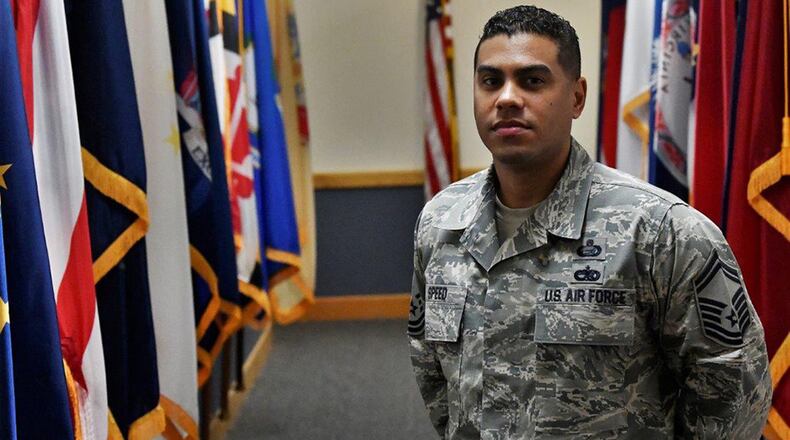Speed is a major command (MAJCOM) training manager and the subject matter expert for enlisted education and training. This expertise includes professional military education programs that affect Air Force personnel around the world.
“I develop, implement and execute training policy by providing guidance and oversight to 96 MAJCOM functional managers, nine base training managers and over 90 unit training managers. In addition, I lead the command-wide formal training program and execution for 450 mission readiness training courses managing $2.7 million funded allocations per year,” he said.
Speed, whose father was in the U.S. Army, was born in Germany. While attending school there, German was the first language he learned.
At age 8, he moved with his family to the United States for his father’s next assignment. This was the first of a series of military moves for Speed, who spent his childhood in locations across the globe, including Oklahoma, Hawaii, Germany, Texas and Colorado.
“I did not know any English. I was excited, but at the time I did not fully grasp the concept that moving meant going to a place with different climate, culture and language,” Speed said. “I remember feeling isolated at first, but I still tried my best to focus on what the teachers and students were saying. Once I caught on and was able to understand American culture, my ability to adapt to different surroundings helped me to be successful in my life and throughout my career.”
After completing high school, Speed decided to carry on the family military service tradition and joined the Air Force.
“My dad retired as a command sergeant major in the Army. I wanted to do the same thing in a different service, so I decided to join the Air Force,” he said.
Just like his childhood, Speed’s own career in the Air Force took him across the globe.
His first assignment was as an avionics technician at Cannon AFB, which he followed with a position as an avionic technician team lead in Korea. He later became a production supervisor for the avionic back shop at Tinker AFB, Oklahoma.
“Every assignment brought different blessings. For my first assignment, I met my wife and adopted a son. During my second assignment, I was promoted to staff sergeant. My third assignment – a mandatory career change – turned out to be a blessing in surprise. During our next assignment, we had our first child,” he said.
When the Air Force went through a period of job reshaping, Speed had an opportunity to take on a new career as a training manager at Eielson AFB, Alaska. Not only did his career and location change, but this was the first time Speed was involved in the support side of the Air Force mission. He was also managing two units at the same time.
“Although I love what I was doing as a maintainer, my skills were broadened so that I would be able to understand the Air Force mission more clearly. Prior to that, I was all about maintenance and solely concerned about keeping birds in the sky. Now I understand what the support side of the mission entails, which is truly amazing to tie it all together,” he said.
After his assignments in Alaska, Oklahoma and a deployment, Speed was selected to fill a key development position at Air Force Materiel Command as a MAJCOM training manager. He has now been with AFMC a little over two years.
“I learned that there is this whole other command that does some phenomenal things with technology. The structure of it was harder to understand initially but being able to finally digest the unique mission within AFMC gives me the ability to elaborate and explain exactly what AFMC does,” he said.
Throughout his career, Speed observed a number of changes to the service as well as the Airmen culture. One thing that stands out to him is that Airmen have a voice. Whether they join after high school, college, or from any other circumstance, they are able and willing to speak out about their ideas to make the Air Force better.
“The things that the Air Force does is incredible. Until you can become part of that, it will be hard for a person to fathom or understand exactly what that means. We all have our own unique jobs. It is our duty to educate the future Airmen how their role fits into the big picture. When Airmen understand their purpose, they will serve with integrity,” he said.
Though he observed his Army father while growing up, it was not until Speed was serving himself that he gained a true perspective on what being part of the military actually means. During his graduation of Airman Leadership School, Speed saw the respect and admiration that people gave his father in his uniform. Everyone in the graduation stood up to give his father a standing ovation.
“I finally understood what my father did for the U.S. Army and what he was fighting for. Seeing him being congratulated by all of those people was one of the proudest moments of my life. The appearance and material of the uniform may change, but I will always have pride in wearing it. I love the concept of putting my uniform on and going to work each day,” he said.
Whether a person is civilian or military, all work to support the Air Force mission and to protect the nation against enemies, foreign or domestic. Everyone in AFMC has a unique job that contributes to this purpose. Whether a person wears a uniform or not, all play a part in protecting and supporting the United States.
This story is part of a series to show who the people are within AFMC. It features not just those who wear the uniform, but a diverse set of military and civilians across AFMC. Whether civilian or military, all are Airmen supporting the Air Force mission.
About the Author
